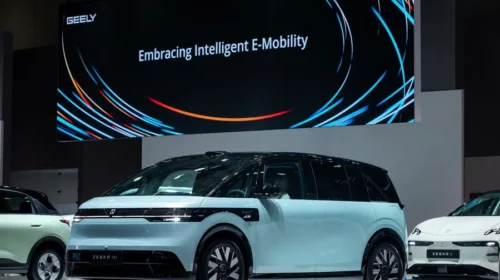Zeekr privatization hits a speed bump

At least six of the new energy vehicle maker’s minority shareholders have sent letters to the NEV maker saying a proposed privatization price is too low
Key Takeaways:
- Six minority shareholders of Zeekr have protested that a proposed offer to privatize the company is too low, according to a Reuters report
- The company’s stock currently trades at a price-to-sales ratio of just 0.63, less than a third of most of its major peers like Leapmotor and XPeng
By Doug Young
Underperformer or underappreciated prodigy?
That’s the big question swirling around new energy vehicle (NEV) maker Zeekr Intelligent Technology Holding Ltd. (ZK.US), whose recent privatization drive has hit a speed bump as some of its minority investors protest that the buyout price is too low, according to a Reuters report last Friday. At the same time, some might also say the company’s low valuation is deserved, since Zeekr was quite late arriving to China’s NEV race, and its sales have also started to contract this year.
This case also shines a spotlight on a major difference between stock exchanges in the U.S. and Hong Kong, which is where most major offshore-listed Chinese companies are traded. Whereas Hong Kong is quite protective of minority shareholders in cases like this, the U.S. is far less so.
At the center of this story is the question of valuation. In this regard, Wall Street investors don’t think very highly of Zeekr, giving it a price-to-sales (P/S) ratio of just 0.63, based on its market value of $6.8 billion at Monday’s close. That’s less than a third of the P/S ratio of 2.19 for three of Zeekr’s top rivals, Leapmotor (9863.HK), XPeng (XPEV.US; 9868.HK) and Nio (NIO.US; 9866.HK). It’s also less than half the 1.50 P/S ratio for Li Auto (LI.US; 2015.HK), China’s other major pure NEV maker.
Nearly a month ago, on May 9, Zeekr controlling shareholder Geely Auto (0175.HK) offered to pay $25.66 for all of Zeekr’s American Depositary Shares (ADS) that it didn’t already own, representing a 20% premium to the company’s stock price over the previous 30 days. The offer raised eyebrows on Wall Street because it came just a year after Zeekr raised $440 million in its New York IPO.
Zeekr said at the time it would set up an independent committee to evaluate the offer. But chances of the offer being accepted and ultimately approved by shareholders were already quite high, since Geely is Zeekr’s majority shareholder with 65.7% of its stock.
Zeekr’s shares jumped after the announcement, and quickly moved higher than the buyout price. At their latest close of $26.76 on Monday, they trade 4.3% above the buyout price, indicating investors believe Geely may raise its offer.
Now, we’re learning that a big reason they believe that is because of the behind-the-scenes lobbying by at least six of Zeekr’s minority shareholders who are saying the price undervalues the company’s shares. Five of those are some of Zeekr’s earliest investors, and have quite big names. That group includes CATL, the world’s largest NEV battery maker, private equity major Boyu Capital, online video giant Bilibili and Intel Capital, a venture arm of U.S. chip giant Intel.
Those four companies, together with Cathay Fortune, have sent Zeekr two letters saying the current offer undervalues the company and are urging it to raise the price, according to Reuters. They argue that Zeekr has better cash flow and profitability prospects than its peers. Another investor, Y2 Capital, sent a similar letter to Zeekr leadership, according to the report.
Independent shareholder approval
The letter from the group of five shareholders urged Zeekr to only proceed with a privatization after receiving approval from a majority of its independent shareholders. That’s where our previously mentioned key difference between U.S. and Hong Kong stock exchanges comes in.
U.S. privatizations can proceed after receiving approval from people holding a majority of a company’s shares. In this case, Geely holds such a majority, meaning any deal ultimately put before shareholders would be guaranteed to succeed.
By comparison, Hong Kong has a rule specifically designed to protect minority shareholders in this kind of situation. In such cases, Hong Kong requires the deal to be approved by a majority of independent shareholders. Thus, in this case, a majority of the holders of the 34.3% of Zeekr’s shares not owned by Geely would also need to approve the deal. For this reason, privatization bids in Hong Kong are far more likely to fail than in the U.S.
The minority shareholders who wrote the letters realize that Geely isn’t under any obligation to raise its offer, which is why they are saying the company should still seek their approval of a final buyout price. So, why should Geely consider raising its offer price in such a situation?
Based on the P/S ratios, Geely’s offer of $25.66 really does look quite low. An offer based on Li Auto’s P/S ratio would yield a buyout price of $64, and the offer price would jump to an even higher $93 based on the ratios for Leapmotor, XPeng and Nio.
Zeekr’s lower valuation is probably somewhat deserved, since the company was quite late coming to China’s NEV auto race. Zeekr sold just 13,727 of its Zeekr-brand cars in April, far less than 41,039 for Leapmotor, 33,939 for Li Auto and 23,900 for Nio that month. What’s more, Zeekr’s April figure was down 14.7% year-on-year, as its sales began to contract after a year of strong growth in 2024.
Those sales figure and sales trends might explain why investors believe Zeekr isn’t worth as much as its peers. But the company also has a major advantage over those rivals from its status as a member of the family of one of China’s most successful private car makers. Geely is quite large and has many listed units, including Sweden’s Volvo and Polestar and Britain’s Lotus, following more than a decade of acquisitions and organic growth.
Geely founder Li Shufu built his empire by being a savvy businessman, which is why he’s quite likely to consider the protests coming from the six unhappy shareholders. CATL is probably one of the top battery suppliers for Geely’s NEVs, and Intel, Boyu and Bilibili are also big names that could damage Geely’s reputation – and future fundraising potential – if they feel they are being treated unfairly.
Accordingly, we probably can expect Geely to raise its offer. The big question becomes, by how much? It’s unlikely to raise it to match the valuations of the company’s Chinese NEV peers. But a valuation based on a P/S ratio of just 0.75, or half of Li Auto’s current ratio, would still equal a buyout price of $30.54, or about 14% above the stock’s current price.
To subscribe to Bamboo Works weekly free newsletter, click here





